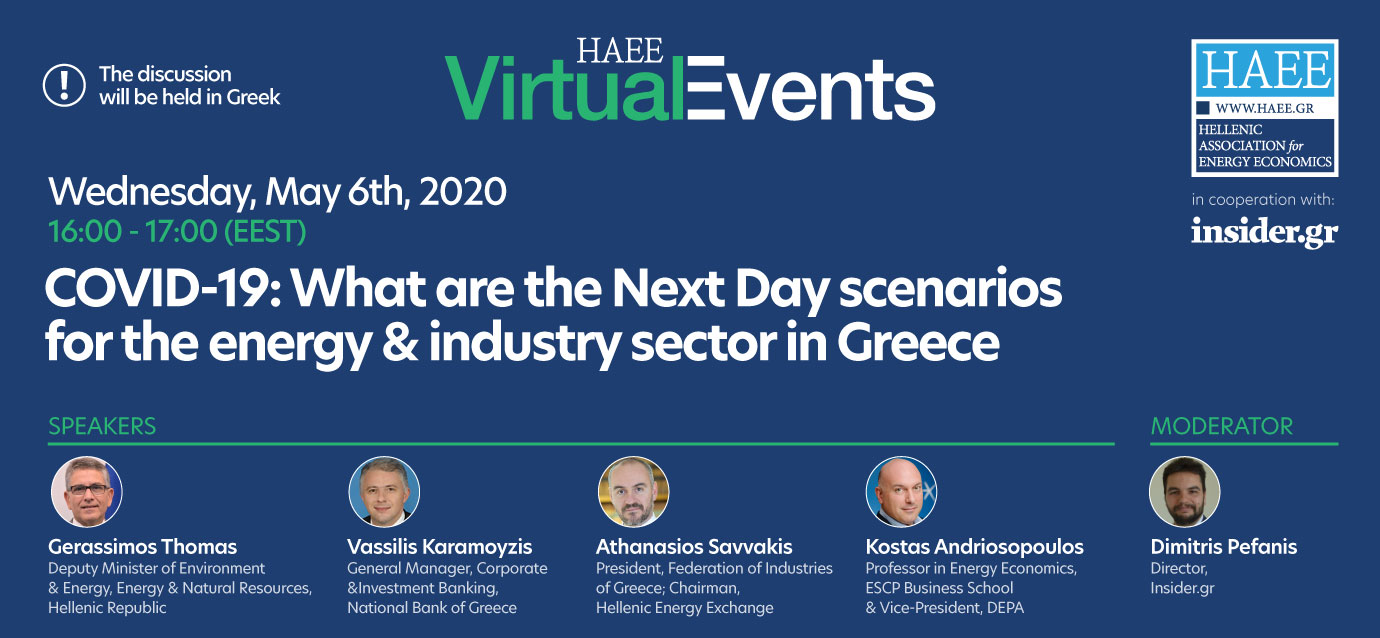Tel: +30 210 92 30 422
E-mail: info@haee.gr
Address
62, Charilaou Trikoupi Str.
Kifissia, 14562
Athens, Greece

COVID-19 | What are the Next Day scenarios for the energy & industry sector in Greece
The post-pandemic era and its effects on energy and industry took centre stage in a recent virtual discussion, as did the reflexes of the market and political leadership. The discussion topic was "Covid-19: What are the next day scenarios for the energy and industry sector in Greece" and was co-organized by HAEE and insider.gr.
Gerassimos Thomas, Deputy Minister of Environment & Energy, Energy & Natural Resources, Hellenic Republic: Green growth will be the spear of the post-pandemic era
The Deputy Minister of Energy and Natural Resources, Gerasimos Thomas, referred to the ministry's strategy regarding privatizations, decarbonization, RES investments and energy saving, as well as the action taken to support energy companies and industry in general.
Mr. Thomas noted that "green growth will be the spear of the post-pandemic era" and stressed that the ministry's policy will focus on planning that has already been announced, that is, on decarbonization, which is steadily advancing, RES, networks and energy efficiency.
On the matter of the adoption of the environmental bill and the projected investments in RES, Mr. Thomas noted that "environmental permits are being accelerated and specific timeframes are being set so that everything that happens can move forward quickly." "Everyone is looking for investment opportunities in RES and energy saving. In energy efficiency, we are seeking a forward-looking harmonization with European directives".
Asked to comment on the cost of energy in industry, Mr. Thomas announced that he would propose further measures to be taken for said sector.
Vassilis Karamouzis, GM, Corporate and Investment Banking, National Bank of Greece: Great investment interest for RES-Full bank backing
Mr. Vassilis Karamouzis, General Manager of Corporate & Investment Banking of the National Bank of Greece, referred to the banking system's response to the conditions created by the pandemic on the energy market and the banks' actions to deal with the crisis in the medium and long term.
Mr. Karamouzis referred to the investments in Renewable Energy Sources, noting that RES are a strategic decision for the EU but also Greece. "The Greek banking system has decided to support them. The good thing about banks is that we have 20 years of experience investing in RES. We have an extensive portfolio of 1 billion in RES and 1 billion in pipeline projects for the coming years", he noted.
On the matter of RES, he went on to point out that "we do not anticipate any interruptions in the flow of financing for RES; investments are progressing normally and we see interest from Greece and abroad for the acquisition of mature projects”.
Athanasios Savvakis, President, Federation of Industries of Greece; Chairman, Hellenic Energy Exchange: Industry to become less vulnerable to "disruptions"
Mr. Athanasios Savvakis, President of Federation of Industries of Greece and Chairman of the Hellenic Energy Exchange, mentioned the need for the industry sector, the production model and the development priorities to adapt to the new circumstances created by the pandemic in our country.
Mr. Savvakis referred to a survey conducted by the association for the period preceding the lockdown and noted, inter alia, that according to its findings, 60% of companies predict a reduction in turnover at the end of the year, with a similar forecast for profitability.
Mr. Savvakis said that the sector that registered a negative record was that of building materials, with a fall of 80% in turnover, while in terms of business climate, 75% stated failure to implement investments.
As for companies operating during the lockdown, the average production cost skyrocketed by 45% due to the measures for the coronavirus plan of attack.
Assessing the measures taken, Mr. Savvakis noted that there is a need to revise the production model, adding that "there is no doubt that the government has taken timely and appropriate measures to strengthen the country's production base. The pandemic shows up the problem of selecting those development priorities that will make the country less vulnerable to such disruptions."
Kostas Andriosopoulos, Professor in Energy Economics, ESCP Business School & Vice-President, DEPA: The international energy environment and the Greek reality
In a special presentation, Dr. Andriosopoulos noted that the global decline in energy demand is approaching the levels observed during the Great Depression of 1930 and estimated that at the end of the year such decline could be as high as seven or eight times that which was observed in a more recent recession, that of 2008.
Referring to the low oil prices, he argued that this has led to a 20% -30% reduction in investment on the part of international groups, while in Greece and Cyprus projects in the hydrocarbon sector are at stake.
"We hope to see a recovery in the market very soon", he said, referring to the positive results that Greece has to show.
More specifically, analyzing the effects of the reduction in demand for electricity in the various countries found in lockdown conditions, Dr. Andriosopoulos pointed out that Greece has made a very good showing in relation to the plan of attack against the coronavirus epidemic and this is reflected in the reduction of energy demand, which did not exceed 10%. This decline is expected to reach 5% annually provided that the positive trend regarding restrictive measures continues.
Referring to the development of RES, he noted that "the figures are optimistic as far as the penetration of RES is concerned in relation to what the National Energy and Climate Plan (NECP) predicts" and estimated that there may be an acceleration as new mechanisms enter the market (target model). The contribution of banking institutions will also be important in this regard.
The discussion was moderated by the director of Insider.gr, Dimitris Pefanis.